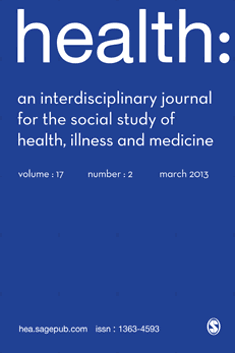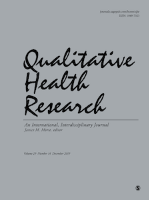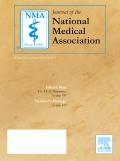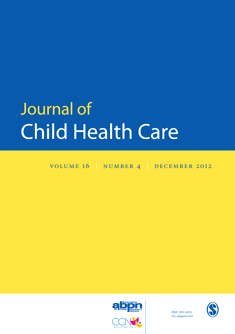
HEALTH
Scope & Guideline
Exploring groundbreaking research for a healthier future.
Introduction
Aims and Scopes
- Qualitative Research in Health Experiences:
The journal focuses on qualitative methodologies to explore the subjective experiences of individuals dealing with health issues, such as chronic illness, mental health, and caregiving. - Social Determinants of Health:
It examines how social, economic, and cultural factors influence health outcomes, emphasizing the importance of context in understanding health disparities. - Interdisciplinary Approaches to Health:
The journal promotes interdisciplinary research that integrates perspectives from sociology, psychology, anthropology, and healthcare to provide a holistic understanding of health. - Patient-Centered Care:
A core focus is on the narratives of patients and their families, advocating for patient involvement in healthcare decision-making and policy. - Critical Perspectives on Health Policies:
The journal critically analyzes health policies and practices, exploring how they impact various populations, particularly marginalized groups. - Innovative Health Practices and Technologies:
It also covers emerging health technologies and practices, examining their implications for patient care and health outcomes.
Trending and Emerging
- Digital Health and Telemedicine:
An increasing number of studies focus on digital health technologies and telemedicine, particularly in the aftermath of the COVID-19 pandemic, highlighting their role in transforming patient care. - Mental Health and Well-being:
There is a significant rise in research addressing mental health, especially in relation to stigma, identity, and the impact of social media on mental well-being. - Narratives and Storytelling in Health:
Emerging themes emphasize the importance of personal narratives and storytelling as tools for understanding health experiences and fostering empathy in healthcare. - Health Equity and Social Justice:
Research focusing on health equity, social justice, and the experiences of marginalized populations is gaining prominence, reflecting a broader societal push for equitable healthcare access. - Embodiment and Lived Experience:
There is an emerging interest in the embodied experiences of health and illness, exploring how individuals navigate their identities in relation to their health conditions. - Environmental and Contextual Influences on Health:
Studies are increasingly examining how environmental factors, such as housing and community resources, impact health outcomes, indicating a shift towards recognizing the role of place in health.
Declining or Waning
- Traditional Biomedical Approaches:
There is a noticeable decrease in studies focusing solely on biomedical models of health, as the journal increasingly favors holistic and socio-cultural perspectives. - Standardized Health Metrics:
Research centered on rigid standardized health metrics and assessments is less prevalent, indicating a shift towards more nuanced and context-specific evaluations of health. - Pharmaceutical Perspectives:
The focus on pharmaceutical interventions as a primary solution to health issues appears to be waning, with more emphasis on alternative and integrative health practices. - Generalized Health Education:
Broad discussions on health education without contextual or cultural relevance are declining, as the journal highlights the importance of culturally sensitive and targeted health education. - Disciplinary Boundaries in Health Research:
There is a reduction in studies that strictly adhere to disciplinary boundaries, showcasing a move towards more interdisciplinary and collaborative research efforts.
Similar Journals

Journal of the American Board of Family Medicine
Connecting Scholars and Practitioners in Family Medicine.The Journal of the American Board of Family Medicine, with ISSN 1557-2625 and E-ISSN 1558-7118, is a prestigious publication dedicated to advancing the field of family medicine. Published by the American Board of Family Medicine, this journal has established itself as a vital resource for researchers, practitioners, and students interested in both family practice and public health. As of 2023, it boasts impressive rankings, being in the Q1 category of Family Practice and the Q2 category of Public Health, Environmental and Occupational Health according to Scopus metrics, reflecting its significant impact and influence in the academic community. The journal's focus on high-quality research ensures that it remains at the forefront of evidence-based practice, fostering the dissemination of knowledge that is critical for improving patient care and outcomes. This journal, although not open-access, provides a wealth of insights and findings relevant to professionals striving to enhance their understanding and implementation of best practices in family medicine. With a converged publication history starting in 2002, it continues to serve as an essential platform for innovative studies and discussions that shape the future of family medicine.

SSM-Qualitative Research in Health
Empowering researchers to illuminate health narratives.SSM-Qualitative Research in Health, published by Elsevier, is an innovative open-access journal dedicated to advancing the field of qualitative research within health and social sciences. With an ISSN of 2667-3215 and an E-ISSN of the same number, this journal has quickly established itself since its inception in 2021, achieving a commendable Q2 ranking in Health (Social Science) and a Q1 ranking in Social Sciences (Miscellaneous) by 2023. Located in the United Kingdom with its publishing office in Amsterdam, the journal aims to provide a platform for researchers, professionals, and students to explore and publish impactful qualitative studies that address the complexities of health issues through rich narrative and contextual understanding. With a focus on fostering interdisciplinary dialogue and innovation, SSM-Qualitative Research in Health is positioned as an essential resource for those seeking to deepen their insights and contribute meaningfully to the conversation surrounding health and social science research.

Health Equity
Driving impactful change in health systems worldwide.Health Equity is an esteemed open-access journal published by MARY ANN LIEBERT, INC, dedicated to advancing knowledge in the fields of health information management, health policy, and public health. With an E-ISSN of 2473-1242 and a commendable Q1 ranking in multiple categories for 2023, including Health Information Management and Health Policy, this journal stands at the forefront of addressing the complexities of health disparities and promoting equitable healthcare solutions. By providing a platform for original research, critical reviews, and innovative methodologies since its inception in 2017, Health Equity plays a crucial role in facilitating dialogue among scholars, practitioners, and policymakers. The journal's commitment to open access ensures that its valuable content is freely available, fostering collaboration and knowledge dissemination within the global health community. As it converges from 2017 to 2024, Health Equity continues to empower its readership to drive impactful changes in health systems and policies worldwide.

QUALITATIVE HEALTH RESEARCH
Elevating Academic Discourse in Health ResearchQUALITATIVE HEALTH RESEARCH is a pivotal journal published by SAGE Publications Inc, specializing in the dynamic field of qualitative research within public health and health services. With an ISSN of 1049-7323 and an E-ISSN of 1552-7557, this esteemed publication has secured a prominent position in academic discourse, as evidenced by its Q1 ranking in the 2023 category of Public Health, Environmental and Occupational Health and a Scopus rank of #100 out of 665, placing it in the 85th percentile. Since its inception in 1991, the journal has fostered innovative methodologies and diverse perspectives, making it an essential resource for researchers, professionals, and students dedicated to understanding the complexity of health experiences and outcomes. Although it does not feature open access, QUALITATIVE HEALTH RESEARCH remains committed to advancing knowledge and scholarly dialogue, ensuring that significant contributions in qualitative methodologies are readily available to a global academic audience.

AIMS Medical Science
Empowering discovery in medical science through open access.AIMS Medical Science is an esteemed open-access journal published by the American Institute of Mathematical Sciences (AIMS), dedicated to advancing knowledge in the field of medical science through rigorous research and innovative methodologies. Established in 2014, this journal has become a pivotal platform for researchers, professionals, and students alike to disseminate significant findings that intersect mathematics and medical science. With an ISSN of 2375-1576, AIMS Medical Science focuses on a wide range of topics, including biomedical research, health analytics, and mathematical modeling in medicine. The journal is known for its commitment to accessibility, allowing freely accessible content to enhance dissemination and collaboration within the scientific community. Although the H-index and Scopus ranks are currently unlisted, the journal aims to foster high-quality contributions that drive forward-thinking solutions to complex health challenges, solidifying its status as a vital resource in the medical sciences.

JOURNAL OF THE NATIONAL MEDICAL ASSOCIATION
Pioneering Research for a Healthier TomorrowThe JOURNAL OF THE NATIONAL MEDICAL ASSOCIATION, published by the NATL MED ASSOC, stands as a premier platform in the realm of medical research and discourse, with a rich history spanning from 1946 to 2024. With an impressive Q1 ranking in the field of Medicine (miscellaneous), this journal is dedicated to advancing knowledge across diverse subfields of medicine, making it a critical resource for researchers, practitioners, and students alike. Recognized for its significant impact, it holds a commendable position within the 83rd percentile of general medicine publications, ranked at #106 out of 636 by Scopus. Although currently lacking open access options, the journal continues to disseminate foundational research and innovative insights essential for driving progress in healthcare. Its commitment to quality publication reflects the high standards of the National Medical Association, ensuring that each article contributes meaningfully to the global healthcare community.

LGBT Health
Exploring the intersection of health and identity.LGBT Health, published by MARY ANN LIEBERT, INC, is an esteemed peer-reviewed journal that has become a cornerstone of research and discourse in the rapidly evolving field of sexual and gender minority health. Since its inception in 2014, the journal has focused on advancing knowledge and promoting better health outcomes for LGBT populations through innovative research, critical reviews, and policy analyses. With an impressive Q1 rating across multiple medical fields—including Dermatology, Obstetrics and Gynecology, Psychiatry and Mental Health, Public Health, Environmental, and Occupational Health, and Urology—the journal holds a significant place in the academic community, demonstrating its pivotal role in addressing urgent health disparities and informing best practices. The journal's Scopus rankings further underscore its prominence, notably ranking #13 in Dermatology and #14 in Urology, reflecting a strong commitment to high-quality scholarship. Although not an Open Access publication, LGBT Health remains a vital resource for researchers, practitioners, and students seeking to enhance their understanding of the unique health challenges faced by LGBT individuals and to contribute to policies that promote equity and inclusivity.

WOMEN & HEALTH
Advancing Knowledge for Healthier Futures.WOMEN & HEALTH is a renowned academic journal published by Routledge Journals, Taylor & Francis Ltd, specializing in the multifaceted interactions between gender and health within a global context. Established in 1975, this journal continuously seeks to address critical issues impacting women's health, making it a vital resource for researchers, health professionals, and students alike. With an impact factor reflective of its significance in the field—ranking in the 69th percentile according to Scopus—this journal is categorized in the Q3 quartile for Medicine (miscellaneous), emphasizing its authoritative contributions to the discourse on women's health. While open access options are not available, the journal remains committed to disseminating pivotal research that informs policies, practices, and education in health sectors worldwide. As it looks towards its converged years from 1975 to 2024, WOMEN & HEALTH stands as a critical platform for advancing understanding and improving health outcomes for women across diverse populations.

INQUIRY-THE JOURNAL OF HEALTH CARE ORGANIZATION PROVISION AND FINANCING
Shaping policy and practice in health care systems.INQUIRY - THE JOURNAL OF HEALTH CARE ORGANIZATION PROVISION AND FINANCING, published by SAGE Publications Inc, is a distinguished academic journal that has been a vital resource in the field of health policy since its inception in 1972. With an impressive impact factor and categorization in Q2 of the health policy quartiles, this journal serves as a crucial platform for disseminating research that addresses the complexities of health care organizations, provision, and financing. Operating under an Open Access model since 2014, it ensures that knowledge is widely accessible, enabling researchers, professionals, and students to engage with cutting-edge findings and debates in health care delivery. With its ongoing commitment to advancing scholarship in health care systems, INQUIRY plays a pivotal role in shaping policy and practice, encouraging robust discussions that foster improvements in health care organization and financing structures.

Journal of Child Health Care
Exploring cutting-edge solutions for child health challenges.The Journal of Child Health Care, published by SAGE Publications Ltd, is a leading academic journal focused on advancing the field of pediatric health. With an ISSN of 1367-4935 and an E-ISSN of 1741-2889, this esteemed journal has maintained a reputation for excellence since its inception in 1997. Covering a wide range of topics in pediatric nursing and child health, it is proudly ranked in the Q1 category of Pediatrics and Q2 in Pediatrics, Perinatology, and Child Health as per the 2023 category quartiles. The Scopus ranking places it among the top resources in the fields of Nursing and Pediatrics, with an impressive 90th percentile ranking. Researchers, healthcare professionals, and students rely on this journal for cutting-edge insights, innovative practices, and evidence-based research that significantly contribute to improving child health outcomes. Although it does not currently offer an open access option, its rigorous peer-review process ensures the highest quality of published research. With contributions shaping the future of child health care, the Journal of Child Health Care stands as a vital resource for those committed to enhancing pediatric wellness in the United States and beyond.